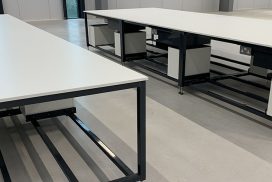Industrial automation and material handling rely heavily on conveyor systems to streamline operations and enhance productivity. These systems are powered by motors and drives, which are crucial components that enable their movement.
This guide explores the various types of motors used in conveyor systems, their applications, and the key factors to consider when selecting the right motor for your conveyor belt.
What are the primary types of motors used in conveyor systems?
The most common types of motors used in conveyor systems include:
- AC Motors
- DC Motors
- Servo Motors
- Stepper Motors
- Brushless DC Motors (BLDC)
Each of these motor types has its unique characteristics, advantages, and ideal applications within conveyor systems.
How do AC Motors function in conveyor applications?
AC motors, particularly three-phase AC motors, are widely used in conveyor systems due to their reliability, efficiency, and low maintenance requirements. These motors operate on alternating current and are available in various configurations, including:
Induction Motors
The most common type of AC motor used in conveyor applications. They are known for their simplicity, durability, and cost-effectiveness. Induction motors are particularly suitable for conveyor systems that require constant speed operation.
Synchronous Motors
These motors offer precise speed control and high efficiency, making them ideal for conveyor systems that demand accurate positioning or synchronisation with other equipment.
Low-Speed Synchronous Motors
Specifically designed for applications requiring high torque at low speeds, these motors are often used in heavy-duty conveyor systems.
AC motors are particularly well-suited for conveyor applications that require continuous operation, high power output, and consistent speed. They are commonly used in large-scale material handling systems, such as those found in warehouses, manufacturing plants, and distribution centres.
What are the advantages of DC Motors in conveyor systems?
DC motors have been a popular choice for conveyor applications due to their excellent speed control and high starting torque. The main types of DC motors used in conveyor systems include:
Brushed DC Motors
These motors offer simple speed control and are cost-effective for smaller conveyor applications. However, they require regular maintenance due to brush wear.
Brushless DC Motors (BLDC)
These motors provide higher efficiency, longer lifespan, and reduced maintenance compared to brushed motors. They are increasingly popular in modern conveyor systems, especially where precise speed control is required.
DC motors are particularly advantageous in conveyor applications that require variable speed control, frequent starts and stops, or reversible operation. They are often used in automated conveyor systems, packaging lines, and sorting equipment.
How do Servo Motors enhance conveyor performance?
Servo motors are a type of motor that provides precise control over position, velocity, and acceleration. In conveyor systems, servo motors offer several benefits:
High Precision
Servo motors can accurately control the position and speed of the conveyor belt, making them ideal for applications requiring precise material placement or synchronisation with other equipment.
Rapid Response
These motors can quickly adjust to changes in load or speed requirements, enhancing the overall responsiveness of the conveyor system.
High Torque-to-Inertia Ratio
This characteristic allows for quick acceleration and deceleration, which is beneficial in applications with frequent starts and stops.
Servo motors are commonly used in conveyor applications that require high precision, such as in electronics manufacturing, pharmaceutical packaging, or robotic assembly lines.
What role do Stepper Motors play in conveyor systems?
Stepper motors are brushless DC motors that divide a full rotation into a number of equal steps. They offer several advantages in conveyor applications:
- Precise Positioning: Stepper motors can accurately control the position of the conveyor belt without the need for feedback sensors.
- High Torque at Low Speeds: This characteristic makes them suitable for applications requiring slow, controlled movement of heavy loads.
- Open-Loop Control: Stepper motors can operate without feedback sensors in many applications, simplifying the control system.
Stepper motors are often used in smaller conveyor systems or in applications where precise positioning is critical, such as in 3D printing, semiconductor manufacturing, or laboratory automation.
How do Brushless DC Motors (BLDC) benefit conveyor applications?
Brushless DC motors, also known as electronically commutated motors, offer several advantages in conveyor systems:
- High Efficiency: BLDC motors are more efficient than brushed DC motors, resulting in lower energy consumption and operating costs.
- Long Lifespan: The absence of brushes reduces wear and maintenance requirements, leading to a longer operational life.
- Precise Speed Control: BLDC motors offer excellent speed control capabilities, making them suitable for applications requiring variable speeds.
- Low Noise: These motors operate more quietly than brushed DC motors, which can be beneficial in certain environments.
BLDC motors are increasingly used in modern conveyor systems, particularly in applications requiring high efficiency, low maintenance, and precise speed control.
Choosing the Right Motor for Your Conveyor System
Selecting the appropriate motor for your conveyor system is crucial for ensuring optimal performance, efficiency, and reliability. By understanding the characteristics and advantages of different motor types, considering the specific requirements of your application, and factoring in environmental and operational conditions, you can make an informed decision that will benefit your material handling processes in the long term.
Spaceguard: Your Partner in Conveyor Solutions
When it comes to implementing efficient and reliable conveyor systems, Spaceguard stands out as a leading UK manufacturer. With a comprehensive range of conveyor solutions, including belt conveyors, roller conveyors, and modular belt conveyors, Spaceguard offers expertise in selecting and integrating the most suitable motors and drive systems for your specific needs.
Our team of experienced engineers can assist you in choosing the right motor type, power rating, and control system to ensure your conveyor operates at peak efficiency. Whether you require a simple belt conveyor for light-duty applications or a complex, automated conveyor system for high-volume material handling, we have the knowledge and products to meet your requirements.
To explore how we can enhance your material handling processes with the right conveyor and motor solutions, contact our team of experts today.



